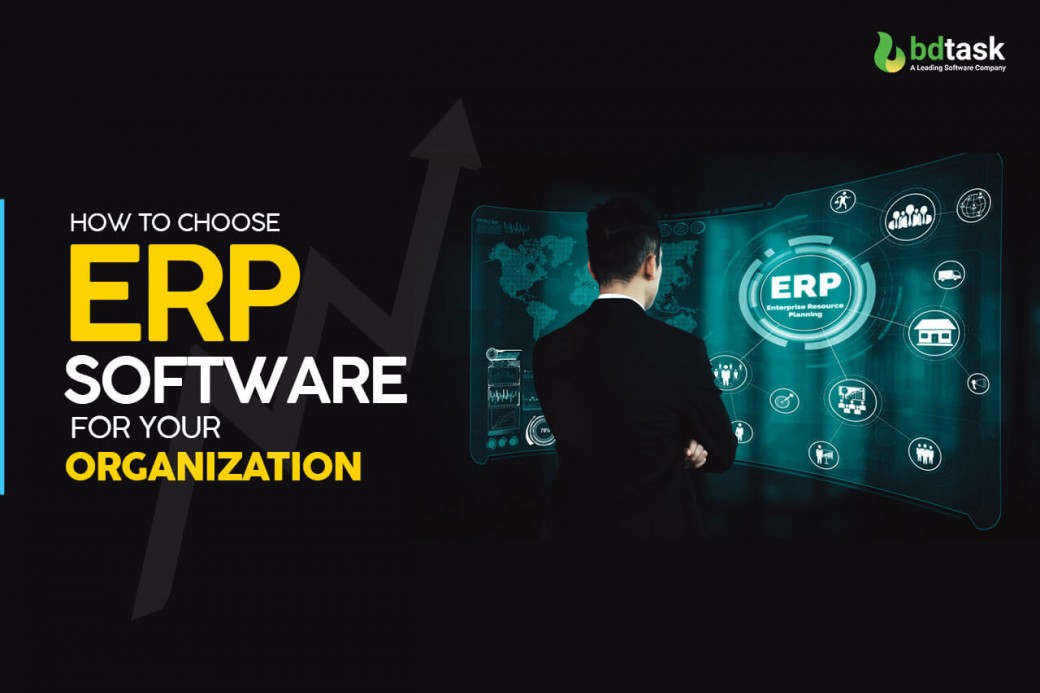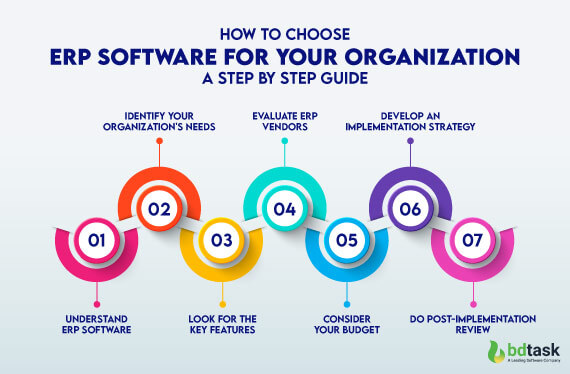How to Choose ERP Software for Your Organization's Success

Imagine a business where every department operates effectively, communicates seamlessly, and reports on time. This is the transformative power of selecting the right Enterprise Resource Planning (ERP) software. An ERP system acts as the central processing unit of an organization. The ideal ERP software is the perfect combination of necessary modules like finance, human resources, supply chain management, and CRM. If you are eager to know how to choose ERP software for your organization, then you are in the right place. This comprehensive blog will help you choose the best ERP software for your organization to achieve maximum success.
How To Choose ERP Software For Your Organization - A Step By Step Guide
I understand that the role of selecting ERP software is very important. If you are struggling to choose the right software for your organization, keep a pause for searching. First, start reading this blog so that you can understand the ideal ERP software selection process for your organization. I have mentioned the step-by-step process so that your journey to implement the best ERP software becomes smooth. This step-by-step process will help to ease your decision-making and implementation of the ERP software for organization growth.

7 effective steps of choosing the best ERP software for an organization -
Step 1: Understand ERP Software
The first step in choosing ERP software for your organization is to understand it. An ERP system is a comprehensive software suite designed to integrate and manage core business functions. It is a single place to perform and monitor every business function effectively. Each ERP module has unique benefits to boost your business operations.
Some common modules of an ERP system include -
a. Finance
The finance department is a big part of any organization. ERP system can help your finance department manage accounting, budgeting, and advanced reporting. It can also automate many repetitive accounting tasks. Ideal ERP software has features to accurately estimate your organization's future financial performance. Also, you can generate comprehensive financial reports with a few clicks of your mouse. This ultimately helps to make good decisions and allocate resources. So, an ERP solution can transform your accounting and financial management operations.
b. Human Resources
Human resource management is another important module of an ideal ERP system. The HR department can automate its many tasks using an ERP, such as payroll, leave, and employee attendance. Payroll can be error-free when you implement the best ERP system in your organization. The HR department can also simplify administration and enhance employee satisfaction. ERP also helps in the recruiting system. Job posting and applicant tracking help HR professionals concentrate on finding the most qualified candidates.
c . Supply Chain Management
Supply chain management is the most important task for any production-dependent business. You can check the inventory level at all stages of your business. The real-time visibility helps to optimize inventory management and minimize stockouts. By using ERP, you can automate regular purchase orders and track those orders and supplier performance. Logistics operations such as transportation, warehousing, and distribution become easy if you integrate the perfect ERP software into your organization. This will ultimately lead to enhanced customer service and reduced logistics costs.
d. Customer Relationship Management (CRM)
Maintaining a good relationship with customers benefits to build loyalty toward a business. Acquiring a new customer is more costlier than keeping one. That is why businesses are now focusing on customer relationship management. The right ERP software can help you manage the customer relationship in your organization efficiently. You can quickly communicate with customers using an ERP system, which can enhance customer service. ERP system allows you to understand the customer journey with your organization. A CRM module also enables to manage marketing campaigns by automating tasks and targeting the right customers. This helps to generate leads and ultimately increase the revenue of your organization.
e. Cross-Departmental Function
Synchronization among departments is essential for efficient business operation. ERP software improves collaboration between departments, which leads to increased efficiency and productivity. ERP creates a single platform for data sharing and project collaboration. So, all the departments can communicate with each other smoothly. This will help you to coordinate different tasks within your organization. You can use any resource by knowing who is available. Thus you can coordinate employees on necessary multiple tasks and create strategic decision-making by using ERP solutions.
Step 2: Identify Your Organization's Needs
The second step in choosing the best ERP software is to identify your organization's needs. There are many ERP vendors in the market, but not all of them can align needs. You should have specific goals and objectives for implementing an ERP solution. You can conduct a thorough self-assessment of your organization. You can evaluate your existing system if you have any. Gather information from key stakeholders across all departments to understand specific requirements. They have real experience and they know the pain points of the system.
Ask a few questions yourself -
- Do you actually need improvement in your organization?
- What are the specific factors that affect your organization's performance?
- How do you want to develop departmental task efficiency?
- Is there a collaboration gap in your organization?
- Is your organization ready for the change that comes with ERP software implementation?
Step 3: Look For the Key Features
One of the important steps in choosing an ERP solution for your organization is checking the key features according to your business needs. Do not miss essential features like Financial and Supply Chain Management, HR, and CRM. We have discussed earlier how these core ERP features help a business and why you need them in your ERP system. Also, consider the industry-based ERP system for specific features. For example, Agro ERP software has a Crop management feature to monitor the crop cycle for each type of crop.
Core features to look for in ERP software:
a. Financial Management
Consider ERP software where finance can manage cash flow and compliance and conveniently do financial reporting. The common features—accounts payable, accounts receivable, and budgeting tools—should be perceived easily. Try the demo version to check that all the calculations are structured and accurate.
b. Supply Chain Management
Your supply chain management module should have key features like demand planning, transportation management, and warehouse management. Check whether the data of these features can synchronize in real-time. Otherwise, the supply chain module will not be effective for your organization.
c. Human Resources
The HR features you should look for in an ERP system are payroll processing, benefits administration, and performance management. The HR module should also have recruitment, hiring, and onboarding features. Training and development, and Employee engagement features are also very important for creating a positive work environment. You should also check these HR features in the ERP to establish a successful business.
d. Customer Relationship Management (CRM)
You should look for a Customer service management and Marketing automation tool along with the common CRM features lead tracking and sales opportunity management. A sales forecasting feature in CRM is also necessary to win in the dynamic business world. So, also check this feature in your integrated CRM module to ensure future growth.
Advanced features to look for in ERP software:
You should also look for some advanced features to pick the best ERP software for your organization. For better performance now and in the future, you can look for advanced analytics in your ERP. This can show you data visually and also interpret the data to make informed business decisions.
Also, check for cloud computing capability and ERP app to use the ERP solution using any device from anywhere. The cloud-based ERP solution should follow the best cyber security measures
Another important thing to check in an ERP is its Scalability and Customization Options. This helps you easily scale up or down based on business fluctuations. You can also customize workflows and integrations to match your specific needs.
Step 4: Evaluate ERP Vendors
To select the best ERP system for your business, you should conduct thorough research on potential vendors. You can start by checking their market reputation, experience, and customer reviews. This will help to understand the reliability of the software company.
You can always request a trial version of the software. A good software company will never prevent you from using their software demo. You can check the user interface, how easy to use the ERP software is, and if there are necessary features that align with your organization.
A good software company provides the best support for software implementation. They also provide free training and further assistance for usage. Evaluate the documentation and training video so that new employees can learn the ERP easily.
Step 5: Consider Your Budget
The business budget is another important consideration when choosing an ERP system. Make sure to thoroughly analyze your organization's costs to align with its financial capabilities. These costs include initial licensing fees, implementation costs, ongoing maintenance, support, and potential upgrades. The initial licensing fee is a one-time subscription fee or monthly/yearly recurring fee.
Implementation and customization costs involve data migration, system configuration, and necessary modifications. Ongoing maintenance, support, and potential upgrade expenses should also be considered. Do a cost-benefit analysis to understand the return on investment. This will also enable you to make strategic decisions about ERP implementation.
Step 6: Develop an Implementation Strategy
A perfect ERP implementation requires a perfect strategy and careful planning. Create realistic timelines for every objective that you want to fulfill. Define the milestones you want to achieve. Build a dedicated team for each department to work actively towards the goal.
For any staff change, prepare to communicate with your new staff and train them to adopt the ERP system. Conduct thorough testing phases to identify and resolve potential issues before the full deployment of your chosen ERP solution. This will ensure a smooth software transition in your organization.
Step 7: Do Post-Implementation Review
After implementing an ERP system, it is important to monitor and evaluate its success continuously. Monitor the key performance indicators (KPIs) regularly. The users of your ERP solution face real issues. So, get feedback from the employees of each department.
Your business needs may change over time. You will need to adapt the ERP system to accommodate the evolving business needs. Regular updates and upgrades ensure the ERP remains optimized. This ongoing process of monitoring, measuring, and continuous improvement of ERP solutions can ensure the sustainable growth of your business.
Conclusion
To succeed in the competitive business world, it is necessary to digitize your business. Perfect ERP software can help digitize your organization and show the road to success. A good ERP that aligns with your organization can improve your business performance by more than 50 percent. On the other hand, incomplete ERP software can only raise your cost and waste your time. After reading this blog I hope, now you gain proper knowledge on how to choose ERP software for your organization. You can follow the mentioned steps and make an informed decision that empowers your business for long-term success.
Happy ERP selection!










